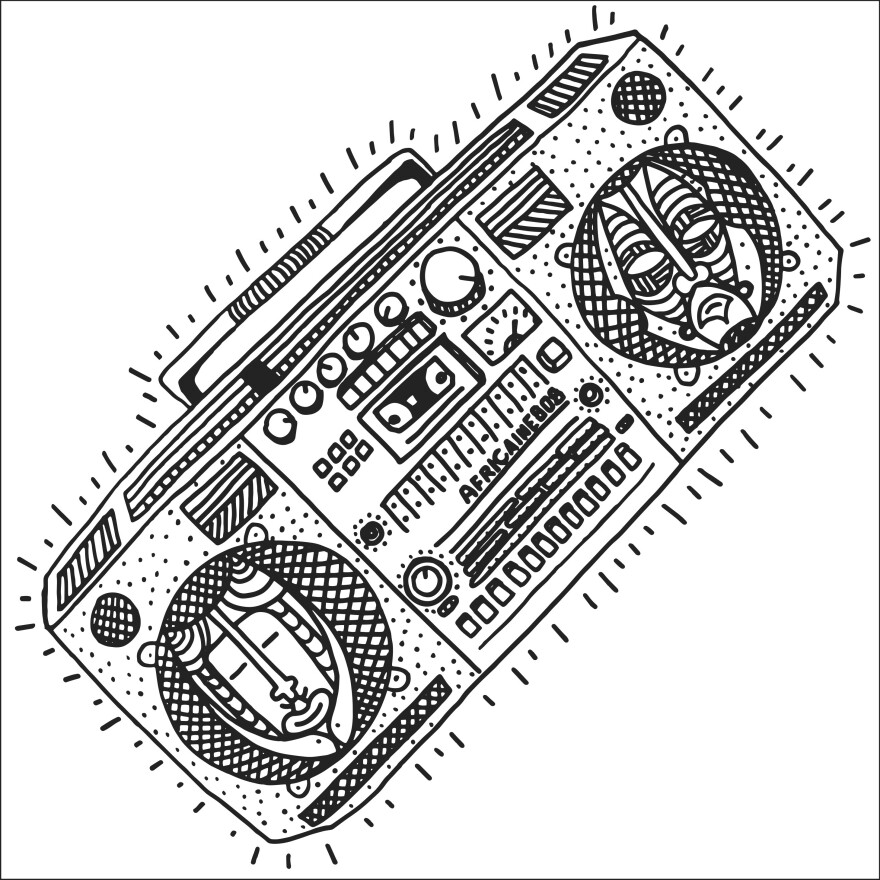Note: NPR's First Listen audio comes down after the album is released. However, you can still listen with the Spotify playlist at the bottom of the page.

Before you listen to Basar, the excellent debut album by Africaine 808, some context is necessary.
Global dance music has made deep inroads into European clubbing in recent years; focus even slightly, and it's everywhere you listen. London has long been a post-colonial melting pot of sound, where influential radio DJs such as Gilles Peterson champion world culture. Yet in the last decade, with Internet-enabled music exchanges flourishing, the city's bass, U.K. garage and funky scenes have incorporated dance styles floating upward from West and South Africa and the Caribbean — as have producers and DJs (and labels and club nights) in Bristol, Manchester and Glasgow.
In Portugal, Lisbon's vibrant scene is built on lo-fi electronics, hip-hop and interpretations of digital-era rhythms such as Angola's kuduro. Paris and Amsterdam are home to reissue labels specializing in rare African grooves, with sleek new remixes of makossa, rai, soukous and various Ethiopian music, and with parties that mix house, disco and pan-African sounds. Even Berlin, long considered merely an outpost of Teutonic techno and house, has hardly been as mono-rhythmic as often described, with city mainstays such as Mark Ernestus (one half of Basic Channel) and Daniel Haaksman (of the Man Recordings label) promoting global inclusivity.
Africaine 808 (A808), the Berlin-based duo of Dirk Leyers and DJ Nomad (Hans Reuschl), is not new to this trend — or, more precisely, to its historical antecedents. Leyers was half of the Cologne/Buenos Aires-based Closer Musik, having spent the early '00s exploring one intersection of techno and global polyrhythms alongside Chile's Matias Aguayo. Reuschl, on the other hand, was a musical disciple of Italy's legendary cosmic disco DJ Beppe Loda. A street-art/photography mainstay of the German music scene for more than a decade (his Keith Haring-like drawings adorn Basar), he adopted the Nomad name in the late '00s and began DJing at a Berlin party called Vulkandance, which featured an eclectic global soundtrack. The two started making music together in 2012, with two rules: the incorporation of a Roland TR-808 drum machine on every track, and a commitment to a cultural exploration of dance music's worldly threads. Even the names of the duo's early singles — "Cosmicumbia" and "Lagos, New York" — spelled out a desire to transcend Berlin's dance-music norms. Yet they also brought to the fore more challenging questions of cultural tourism. So how do a couple of talented, knowledgeable, (presumably) well-meaning Europeans incorporate the sound of the world without repeating mistakes they're ostensibly trying to correct?
Basar does so by painting a broad canvas grounded in the historical idea of the diverse, inclusive, democratic dance floor, and goes looking far deeper than Leyers and Nomad did in their singles for evidence to prove the thesis. One answer lies in the drums, in how A808 mixes programmed beats and their live counterparts — played by the Ghanaian highlife percussionist Eric Owusu and the Congolese/German vocalist-drummer Jean Dominique "Dodo" N'Kishi, best known for his work with Mouse On Mars.
The other is in the fact that A808's search for the perfect beat takes it not only toward far-flung locations or exotic sounds, but also toward early-'80s Brixton ("Language Of The Bass," a cusp-of-Acid-house story narrated by Alex Voices about "soundsystems" and such), to some Caribbean-ized Bayou previously inhabited by Ninja Tune's sampledelic producers ("Crawfish Got Soul"), and to smoky nightclubs with Balearic trip-hop (the ballad "Ready for Something New," featuring the Israeli singer Ofri Brin). The result is an album that transcends dance-music stereotypes through extreme juxtapositions, moving beyond journeys "into sound" or "around the world," while still fully conscious that it's doing those things, as well. From its grandly titled opener, "The Awakening" — a mix of squiggly jazz and space-age pop that melts into acid-fusion skronk — it's music for listening as well as movement.
There is, of course, plenty of globetrotting boogie to be had — and yet where such clichés can form creative cul de sacs, A808 finds exquisite escapes. "Ngoni" begins with the titular string instrument playing wonderful melodies while a kick and an 808 hammer underneath. Then, halfway through, something strange happens — the ngoni itself disappears, and its melodic line is taken up by jarring industrial echo (a dubstep kind of sound, but far more supple), as if the two musical worlds were conversing. The title track is akin to an un-abrasive take on Aphex Twin's acid classic "Didgeridoo," a synthetic re-creation of an imagined memory; whereas "Yes We Can" brings together an actual didgeridoo (or, more likely, one played via keyboard), a steel guitar and a second-line/batucada that gets swallowed up by electronics. Maybe best of all is "Rhythm Is All You Can Dance," co-written by N'Kishi and featuring his myriad voices; what begins as a kalimba-augmented shuffle explodes into an electro anthem via TR-303 bass synth.
Is it fair to attribute Africaine 808's acclaim (however small-circle) to European club culture's momentary fascination with the rhythms of the world? Indisputably. But Basar is more than another simple bit of evidence of "trending." It is the result of two globally informed dance-music imaginations trying to save themselves from the insular thinking of the status quo, by looking outside. As long as the samples were cleared and the guests got paid, this is exactly the sort of culture-swapping worth celebrating.
Copyright 2022 NPR. To see more, visit https://www.npr.org.




